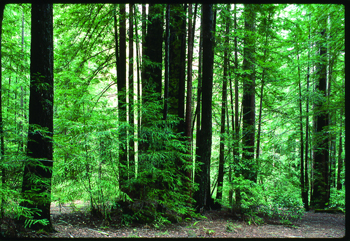Campus News
Student-run Carbon Fund fights waste and encourages green practices
It’s one thing to grouse about food waste, water consumption and inefficient energy use on campus. It’s another thing to reach into your own pocket, raise a pool of money and help UC Santa Cruz solve the problem. An enterprising group of UCSC students is doing just that with the newly instituted Carbon Fund, founded last spring to diminish the campus’s carbon footprint.

It’s one thing to grouse about food waste, water consumption and inefficient energy use on campus.
It’s another thing to reach into your own pocket, raise a pool of money and help UC Santa Cruz solve the problem. An enterprising group of UCSC students is doing just that with the newly instituted Carbon Fund, founded last spring to diminish the campus’s carbon footprint with environmentally friendly projects undertaken by staff, faculty and students.
So far the group has set aside an impressive $100,000 for this purpose.
The Carbon Fund uses money raised by Measure 44, a student-approved ballot initiative that raises money through a $3-per-quarter student fee. The fee itself is not new; it has been in place since 2006, when students imposed a previous renewable energy ballot measure. Measure 44 simply redirects that money to the carbon fund.
“The great part is that everyone can spare three dollars a quarter so it doesn’t seem that big of a deal and it really has a huge impact,” said Carbon Fund outreach coordinator Lindsey Roark, 21, a third-year student majoring in ecology and evolutionary biology.
The fund is yet another example of students taking it upon themselves to fund green initiatives. Another example is the recently completed “green” retrofitting of the Cowell Student Health Center, which was paid for with student fees and earned the campus its first “Gold” LEED certification this year.
Cameron Fields, 20, Campus Climate Action Intern, leads the group of students who oversee the Carbon Fund, which is set to continue for at least the next decade. Fields, an environmental studies/economics double major with a minor in politics, called the fund and the grant criteria “completely transparent.” The money will be awarded based on a point system, and the guidelines are online.
By its very nature, the application process guarantees that successful applicants will be thoughtful and thorough. Applicants must estimate the energy or resource reduction that their projects will achieve in therms, gallons of water, gallons of fuel, or pounds of waste, while estimating the amount currently used.
“For example,” the application reads, “if your project will reduce 100 car trips to campus per year, you’ll need to compute how many gallons of gasoline would have been used in those 100 trips. If your project will reduce electricity use from outdoor lighting, you’ll need to compute how many kWh would be consumed with and without your project.”
It also addresses practical concerns: will the project need on-going funding after the completion of this grant? Hopefuls must also discuss their projects’ potential social benefits.
Aware of the challenges, the fund’s administrators will hold grant workshops from noon to 1 p.m. and at 5 to 6 p.m. on Thursday, February 17, at the Cervantes/Vasquez room located above the Baytree Bookstore on campus. These meetings are designed to help applicants, but they are not mandatory.
While the application process is thorough, the funding committee is looking for passion and commitment and not absolute perfection, Roark said.
“We want to get a lot of project ideas,” she said. “They can be works in progress. This is all about developing student, staff and faculty collaboration. We would like to fund several different projects – and we’re hoping people will take their amazing ideas and bring them to life on the campus.”
The committee, composed of five student members of campus sustainability groups, three staff members and an ex oficio faculty member, is still working out the specifics but Roark said that an “appropriate amount of grant money” would be somewhere between $5,000 and $10,000 per project.
Several staff and faculty representatives, including energy manager Patrick Testoni, purchasing specialist Kathryn Cunningham, environmental studies professor Daniel Press and environmental studies lecturer James Barsimantov are volunteering their time and expertise as advisors to the Carbon Fund.
The committee has yet to receive an application but expects a pile of them when the February 28 deadline rolls around. Already, Roark has heard a few ideas being discussed. One is a plan to retrofit water fountains on part of campus to make it easier for people to refill their reusable water bottles, cutting down on the consumption of single-use water bottles.
“It would be more like a spigot so you don’t have to bend your water bottle down and shove it underneath there,” she said. “A project like that could be launched with $5,000 to $10,000.”
Applications may be sent via email to carbonfund@ucsc.edu.
For additional information, visit http://sustainability.ucsc.edu/